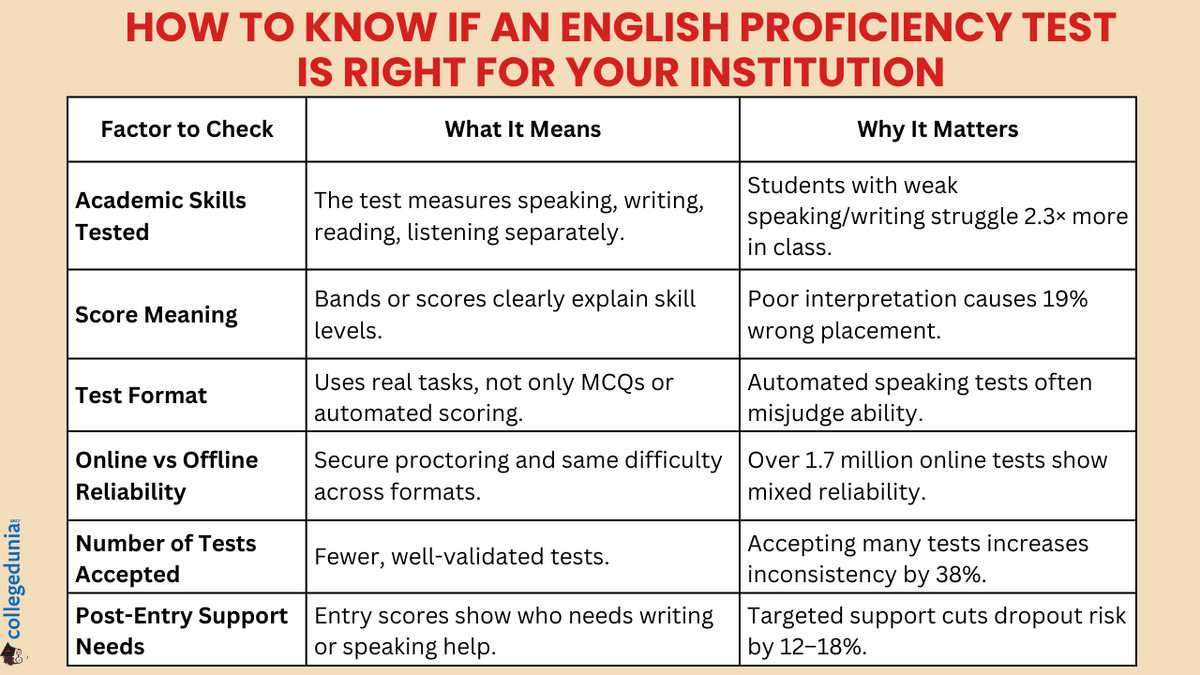How Universities Can Choose the Right International English Language Test
Global mobility data shows that universities now receive over 5 million English test results every year, but 27% of institutions say that test scores do not fully match classroom performance. This gap makes it important for universities to choose the right international English language test that reflects real academic needs. Many institutions start by reviewing whether IELTS English aligns with their curriculum and whether the IELTS Exam Pattern captures academic behaviours accurately.
Check:
- Is IELTS the Perfect English Language Test?
- Check the Average Score of IELTS General and Academic Tests

Why English Tests Matter in the International English Language Testing System
Studies across 34 countries confirm that English proficiency is one of the top three predictors of first-year GPA. When a test does not measure skills accurately, students with similar scores can perform very differently in class, creating academic imbalance.
A popular Reddit thread discusses this problem, where a user shares their experience: "I got 9 9 in R and L but only 6 and 6.5 in the other 2 so i guess it's normal." This reflects why universities must examine how well a test measures all four skills before accepting it.

How to Evaluate Academic Skill Quality in Tests Like IELTS English
Between 2022–2024, universities reported that students with weak speaking and writing bands struggle 2.3 times more with classroom communication. Tests that rely mostly on MCQs or full automation often miss reasoning and argument-building skills.
A common complaint on Reddit highlights that "Speaking goes better live. Your grade will heavily depend on examiner's impression of you and getting a good one is much simpler in person." This helps institutions understand why tests with human examiners, like typical IELTS English formats, often produce more reliable academic outcomes.
Also Check:
- Check IELTS Score for Top Universities, Immigration, and Scholarship
- IELTS Band Score: Section-wise Band Score
Understanding Score Meaning in English Proficiency IELTS Requirements
Global benchmarking shows that unclear score interpretation leads to 19% incorrect placement in either foundation programs or direct entry. Many universities use overall scores without understanding what each band means.
On Quora, users discuss how admissions processes often prioritize efficiency over deep verification, with one noting that admissions officers "spend 8 to 20 minutes on the application," leaving little room for detailed checks on score descriptors. This reinforces the need for stronger score literacy when setting English proficiency IELTS requirements.
Also Check:
IELTS Band Descriptors: Understanding IELTS Band Description
The Risk of Accepting Too Many English Tests in the Exam IELTS Landscape
Institutions accepting 4-6 types of tests spend 38% more time comparing results. Newer online-only exams sometimes show higher score volatility, especially in speaking.
A Quora discussion points out that "some schools will only accept the TOEFL and others will accept either the Duolingo or the TOEFL," illustrating how universities often broaden test acceptance for applicant convenience rather than rigorous equivalence checks. This viewpoint is important when reviewing the IELTS exam landscape.
Why a Single Score Is Not Enough in IELTS English or Other Tests
Around 31% of students who meet the minimum score still have major differences between speaking, writing, reading, and listening skills. These imbalances are the strongest predictors of early academic struggle.
Reddit discussions frequently mention that students “pass the test but freeze during real classroom discussions,” with one user sharing, "If IELTS had truly measured actual English proficiency then I shouldn't have to struggle in SAT English with an 8.5." This highlights the limits of over-relying on the overall band in IELTS English or any other exam.
Evaluating Online Formats Like IELTS Exam Online
More than 1.7 million candidates used some form of IELTS exam online in the last two years. While online formats increase access, reliability depends on strong proctoring and secure test conditions.
Online conversations show concerns about identity checks and task difficulty differences between online and offline exams, with one Reddit user describing how "they are very paranoid regarding the verification of the identity of the test takers" during online processes. Universities should verify whether online formats maintain equivalent standards.
Using Practice Test Data From the International English Language Testing System
Tracking performance from the International English Language Testing System practice test helps universities predict which students need early support. Institutions that match practice performance with real course performance report 12–18% lower dropout risk.
Common student questions on Reddit include concerns like “I'm scoring average of 7.5 in listening on the practice tests while reading scores are varying from 6.5 to 8.5. What should I make out of my performance?” This shows why institutions should consider practice-test insights when designing support programs.
Building Staff Literacy for Better IELTS Preparation Insights
Universities with strong internal assessment literacy report 15% higher teaching satisfaction because student skill profiles are more predictable. Internal teams that understand scoring, reliability, and trends can make better decisions about which tests to accept.
Quora discussions reveal that many admissions teams “do not have time to read research,” as one contributor explains that "very little time is spent on these applications. They are almost immediately sorted into 'probable admit' and 'probable reject.'" Building simple, yearly review processes can support better decisions related to test formats and IELTS preparation guidance.
FAQs
Ques. Is IELTS really necessary for US university admissions, even if English is my first language?
Ans. Quora users from English-medium backgrounds often question this, noting that many US schools still require it despite alternatives like SAT. One applicant highlighted that unis "do not understand" exemptions for those from UK/Ireland/Australia/NZ, forcing unnecessary tests.
Ques. Does a high IELTS score give me a real edge in university admissions?
Ans. Quora community consensus is yes, but only to an extent. It meets thresholds and signals readiness, but isn't a golden ticket. A user explained that scores above the minimum (e.g., 7+) can strengthen apps, especially for competitive programs, but pair it with strong academics.
Ques. Should I take IELTS Academic or General for university applications?
Ans. Almost all Quora users agree that one should go for Academic, as it's tailored for higher education tasks like essays and lectures. General is more for immigration/work. One poster noted unis rarely specify but default to Academic, warning that mismatches can lead to rejections.
Ques. What if my practice IELTS scores don't predict my real exam results?
Ans. Reddit users frequently worry about this gap, with tips focusing on mock tests under timed conditions. One shared averaging 7.5 in listening practice but varying wildly in reading (6.5-8.5), asking how to interpret for actual performance.
Comments